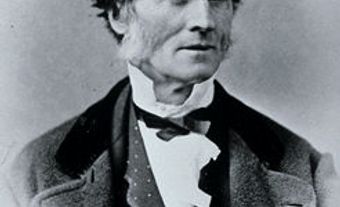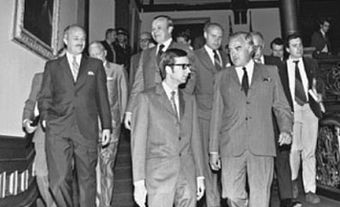
Sir Oliver Mowat played an instrumental role in Confederation, participating in the Québec Conference of 1864 and setting the stage for the decentralization of federal power. Though not a chief architect of Confederation, Mowat mounted a campaign that spanned a quarter-century to help define Canada’s Constitution.
Early Life and Career
Oliver Mowat’s father was a military veteran of Scottish descent who came to the Canadas as part of the British army in 1814. Upon discharge, he settled near Kingston, and became a partner at a general store.
Mowat was raised in a Presbyterian family and privately educated in Kingston before becoming John A. Macdonald’s first articled law student. He was admitted to the Bar in 1841, and quickly became a successful equity lawyer in Toronto. It was his growing professional standing that eventually pushed him into public life.
Political Career
Oliver Mowat was somewhat weak-voiced, bespectacled and pale — but appearances were deceiving. He was known for his rigid sense of duty, even temperament and moderate manner.
Mowat initially became director of the Upper Canada Bible Society and then the Anti-Slavery Society of Canada. Later, he was appointed to the senate at the University of Toronto, and was then elected as a bencher of the Law Society of Upper Canada in 1853.
Though Mowat was raised in a Conservative household, as an adult he opted for the Reform Party. When he entered political life, he pledged to conduct himself as a “Christian statesman.” The assertion reflects the pains Mowat went to as a politician to try to reconcile his actions with his principles. History considers him to be a consummate politician who had a genius for reconciling duty and opportunity during his long career.
Mowat briefly served in municipal politics from 1857 to 1858 as an alderman for the St. Lawrence Ward in the City of Toronto. There he was the harbour commissioner in 1857, and he served on the standing committees of finance and railways. He also chaired the committee on public works and gardens, and played a prominent role in the establishment of municipal parks.
While still serving as an alderman, Mowat attended a political convention organized by George Brown and was appointed to the central committee of the Reform Alliance. In 1858, he began to sit in the Assembly of the Province of Canada as the representative for Ontario South. There, he was a prominent Reform leader, considered to be Brown’s right-hand man. He was the provincial secretary in the brief administration of Brown and Antoine-Aimé Dorion in 1858. He then served as postmaster general in the John Sandfield Macdonald–Dorion regime in 1863–64. He later returned to that position during the Great Coalition of 1864.
Confederation
Oliver Mowat attended the Québec Conference of October 1864 and was a very active participant. He is often credited as the delegate responsible for putting decisions made at the conference into constitutional and legal shape.
During the conference, Mowat expressed support for the elective principal, representation by population, and a uniform system for criminal law. But his most important contributions came when he moved resolutions defining provincial legislative powers, and subjecting provincial legislation to reservation and disallowance by the federal authorities (see Distribution of Powers). These contributions are of particular importance because they had significant bearing on provincial rights, which created ongoing controversy in the development of Canada over the next 40 years.
See also Ontario and Confederation.
Premiership and Late Political Career
Soon after the Québec Conference, in November 1864, Oliver Mowat was appointed vice-chancellor of the Upper Canada Court of Chancery. He quickly became known as a judge who was not readily thwarted by technicalities in rendering justice. Following Confederation, he maintained his post as vice-chancellor of Ontario until 1872, when he succeeded Edward Blake as premier.
Ontario came of age economically, socially and politically under Mowat’s leadership. Agriculture was modernized, industry recognized, education and scientific areas cultivated, urban problems addressed, and trade unions accepted as part of society. Substantial government regulation became part of provincial life, elections by secret ballots were implemented, and numerous social programs were introduced.
Mowat is sometimes portrayed as a troublemaker who backed out of the vision of Confederation agreed to at the Québec Conference. He was undoubtedly a thorn in Sir John A. Macdonald’s side for the remainder of his political career.
Mowat was Canada’s first influential advocate for provincial rights. From the start of his premiership, he was confident that the British North America Act guaranteed provincial sovereignty. Mowat and his government eventually decentralized Canada’s political structure, and gave the provinces more power through a series of legal and political battles with Macdonald and the federal Conservatives. Macdonald’s conception of Canada was of a highly centralized state, and Mowat’s move to decentralize caused Macdonald to label him the “little tyrant.” (See also Distribution of Powers)
Mowat participated in the first conference of Canadian governments in Québec City in 1887. Under Mowat’s chairmanship, the conference adopted resolutions that demanded the province have sovereign control of affairs within its jurisdiction. After the conference, the federal government was much more reluctant to disallow legislation on political grounds and disputes over jurisdiction were generally resolved by judicial reference.
His efforts also helped establish Ontario as the most dominant and richest province within Confederation. He spent 24 years as a Liberal premier, elected six times as the provincial representative for Oxford North, and attorney general until 1896 when he was appointed to the Senate. There, at the age of 76, he served as government leader and became federal minister of justice. He was knighted in 1892.
He left Ottawa in 1897 to become lieutenant-governor of Ontario. He died at Government House in April 1903 at the age of 82.
Legacy
Mowat is considered one of Canada’s first political giants and the first great premier of Confederation. Though he’d always been a skillful electoral politician, as premier he was able to build a pragmatic and moderate Liberal Party that represented Ontario’s diverse electorate, including Protestant, Catholic, rural and urban voters. His tenure in office is representative of the emergence of modern Ontario. He is held in high regard as a party builder who played a key role in the development and establishment of the structure and style of politics in 19th-century Canada and provincial relations into the 20th century.

 Share on Facebook
Share on Facebook Share on X
Share on X Share by Email
Share by Email Share on Google Classroom
Share on Google Classroom


